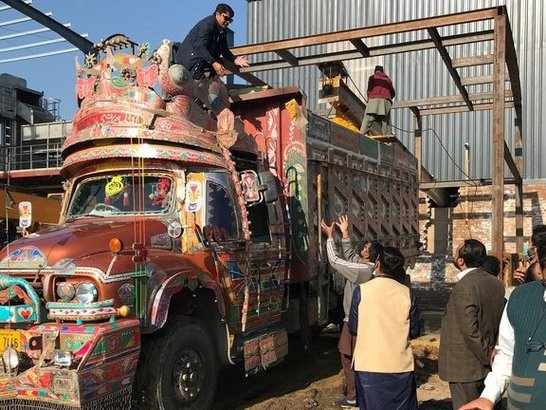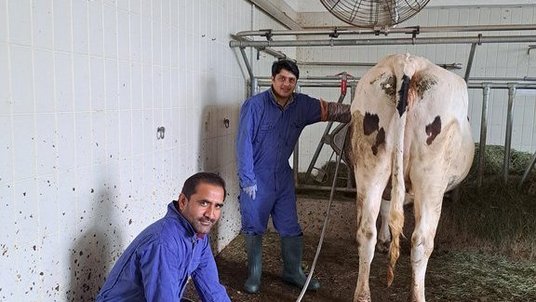
From Waste to Feed. Turning fruit and vegetable wastes into livestock feed: Sustainable feed resources with functional properties

Cooperating countries: Pakistan and Austria
Coordinating institution: University of Veterinary Medicine Vienna
Partner institutions: University of Veterinary and Animal Sciences, Lahore, Pakistan
Project duration: 1 September 2021 - 30 June 2024
Budget: € 43.600,00
This picture was taken during the team's visit to a citrus juice plant and the collection of the by-product in February 2022.
Project Summary
As the consumer demands keep rising especially for fruits and vegetables, more wastes are generated causing environmental problems as well as a health hazard when the wastes are not properly managed. A lot of nutrients and energy can still be harnessed by converting these wastes into nutritious feed for ruminants. This strategy not only reduces waste quantities but also converts wastes into valuable protein sources that are still inadequate for the populations of the Global South region. Moreover, turning food wastes into feed is a strategy that can also be integrated into all farm scales because no intensive infrastructure and equipment are required as it will be, for example, for biogas production. Pakistan is an ideal country to adopt this strategy. Pakistan holds a large number of cattle livestock and experiences feed scarcity. At the same time, the country is an important world producer of fruits. Accordingly, via collaboration between University of Veterinary Medicine, Vienna, Austria and University of Veterinary and Animal Sciences, Lahore, Pakistan, the proposed project will focus on promoting opportunities for upcycling fruit and vegetable wastes and by-products as sustainable feed resources for cattle farming in Pakistan. An added value of such wastes due to their phytochemicals is also expected.
The project will start by exploring common fruit and crop wastes from citrus, mango, apple fruits, and sugar beet in Pakistan. The selection is based on their abundance, diverse nutrient composition, and diverse bioactive phytochemical profile to diversify its practical applications. Subsequently, the institution partner in Pakistan will perform evaluations of preservation methods, chemical analysis, storage stability, and in vitro digestibility. The knowledge gained from the work in Pakistan will be used to develop the next step dealing with detailed evaluations of effects of selected sources on ruminal fermentation using the Rumen Simulation Technique at the host institution in Austria. In the last phase of the project, we will hold a workshop to disseminate the project results and transfer the knowledge to the research community in Pakistan. The proposed project will create the platform for the local research communities in Pakistan sharing the mutual goal in finding ways for sustainable use of food wastes as well as to attenuate the ever-growing competition between the use of resources directly for human nutrition or as feedstuffs for livestock. By revealing possible resources and know-how knowledge, we hope to stimulate the country’s interest in research dealing with sustainability in livestock production and make further progress. In a long run, we could foresee a reduction of farm feed costs and improved farm efficiency in a more sustainable way.
Contribution to Sustainable Development
The project outcomes directly address two United Nations Sustainable Development Goals (SDGs). First, the project has direct relevance for SDG 12 (Ensure sustainable consumption and production patterns) by providing options to substantially reduce the waste generation in food production through recycling and reuse. Turning food wastes into livestock feed is practical and cost-effective because no intensive infrastructure is needed and thus it can be adopted by farms of any scale and production system.
Additionally, the project also addresses SDG 2 (Zero Hunger) by reducing feed scarcity and furnishing an economically viable feed option, thereby promoting livestock production and ensuring food security. The application of the project outcomes helps instantly in reducing feed costs, which will stimulate the income growth of farmers, and ultimately contribute to lowering the production cost of livestock products. This could lead to an increase in per capita consumption of high-quality proteins from livestock production and improve the nutrition of the communities.
In terms of implementation of gender and diversity issues, the project ensures equitable access for beneficiaries of any gender and empowers all communities from small to commercial farmers as well as feed producers. As such, the project not only addresses environmental and economic sustainability but also supports social equity in accessing the project’s outcome and application.

